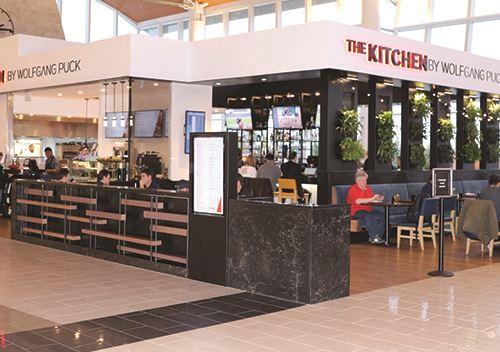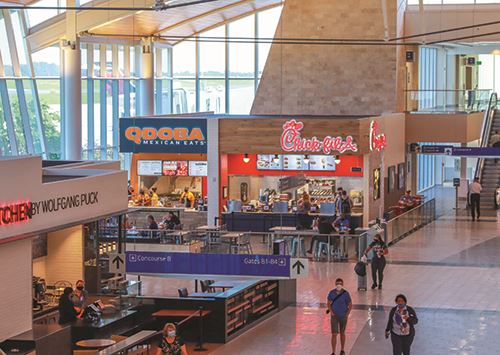Without question, COVID-19 has been a test for airports large and small, metropolitan and rural. In August 2020, during the early throes of the pandemic, Greenville-Spartanburg International Airport (GSP) changed from traditional concessions contracts to more narrow management agreements for five of its nine food and beverage locations.
Without question, COVID-19 has been a test for airports large and small, metropolitan and rural. The entire industry has had to modify standard practices due to unprecedented challenges presented by the pandemic.
In August 2020, during the early throes of the pandemic, Greenville-Spartanburg International Airport (GSP) changed from traditional concessions contracts to more narrow management agreements for five of its nine food and beverage locations. Airport officials note that the new strategy helps safeguard GSP’s established levels of customer service and provides GSP with more input regarding day-to-day operating decisions that drive sales.
It also affects the South Carolina airport’s balance sheet. Previously, all concessionaires leased space from the airport, invested in their individual concepts and locations, and kept the associated sales/profits, less the amount paid to GSP per standard revenue sharing agreements. Now, an outside firm manages a handful of concessions and GSP keeps all of the sales and profits they generate less an incentive fee that the firm earns from those profits. The airport no longer collects rent for the concession space and is now responsible for investing money to develop the individual businesses.
|
facts&figures Project: Transitioning from traditional concessions contracts to in-house management & operating agreements Location: Greenville-Spartanburg (SC) Int’l Airport
Scope: 5 food & beverage concessionaires Concessions Affected: Chick-fil-A, The Kitchen by Wolfgang Puck, Thomas Creek Grill, RJ Rockers Flight Room reopened under purview of new operator; DC-3 Hot Dogs was replaced with QDOBA Mexican Eats New Management/Operating Services Company: Metz Culinary Management Terms: 5-year contract with 5-year option Cost: $1.2 million buyout of OHM Concession Group’s local assets
Timeline: Airport purchased OHM’s local assets Accolade: 2021 Adaptability Award, Airports Council International–North America Key Benefits: Airport has more control over customer service & greater input about operating practices; airport retains all revenue instead of receiving monthly revenue sharing payments |
In July 2020, GSP spent $1.2 million to purchase the local assets of OHM Concessions Group, a St. Louis-based firm that ran five food and beverage concessions at the airport: three chain locations—Chick-fil-A, DC-3 Hot Dogs and The Kitchen by Wolfgang Puck—and two local brewery concepts—Thomas Creek Grill from Greenville and RJ Rockers Flight Room of Spartanburg.
“When the opportunity came available for those five concepts, we just decided to bring it in house,” explains Scott Carr, vice president of Commercial Business and Communications for the airport. “We don’t like to take on unabated risk, but we aren’t afraid of taking on calculated risk. In this case, it was a calculated risk that provided us with a good opportunity to enhance the passenger experience and make sure that we are in control of providing excellent customer service.
“We have done this before with some of the other business lines that we had here at the Airport District,” he adds, referring to the fixed-base operator and cargo services that GSP has operated profitably since 2016.
In those cases, the airport established an operating unit named Cerulean Aviation, which is run by GSP staff. For concessions, officials took a slightly different approach by hiring a management and operating services contractor. The five concessions formerly operated by OHM shuttered for various lengths of time during the associated bidding process and subsequent transition.
“There was a time when the lights were out at Chick-fil-A, from roughly May of 2020 until we reopened in November 2020,” Carr recalls.
In the meantime, GSP had food and beverage options run by other concessionaires, such as Hudson Group, to offer guests. They included Vino Volo, Dunkin’, Baskin-Robbins and Flatwood Grill. “Quite frankly, it was probably just the right concessions mix for the number of passengers traveling during that pandemic time,” says Carr. “We would have been ‘over-concessioned’ had everything else been open.”

New Management
After vetting seven bidders that responded to the airport’s request for proposals, GSP selected Metz Culinary Management in September 2020. Chick-fil-A reopened under its purview in November 2020, followed by the Wolfgang Puck location in January 2021. The airport opted to replace DC-3 Hot Dogs with QDOBA Mexican Eats, which opened in August 2021. The two local brewery concepts are expected to reopen as enplanements recover to pre-pandemic levels—hopefully this year.
 Maureen Metz, vice president of marketing for Metz Culinary Management, notes that her family’s business expanded into the airport sector after amassing experience in education and healthcare for more than 20 years.
Maureen Metz, vice president of marketing for Metz Culinary Management, notes that her family’s business expanded into the airport sector after amassing experience in education and healthcare for more than 20 years.
“We started in 2016 with the airport near our hometown, Wilkes-Barre Scranton International, and it worked out well, so we continued to look for opportunities in the airport market,” she explains. “We thought it was a good fit for us because not only are we an on-site food service company, but we also franchise and run the restaurants. We thought our retail experience was the perfect fit in the ever-changing airport dynamic.”
Rick Sell, vice president of Restaurant Operations for Metz Culinary Management, notes that the company’s airport division currently manages food, beverage, retail and vending services in four U.S. airports.
“When the RFP was issued at GSP, we were already familiar with their operations, commitment to quality and the passenger experience,” says Sell, adding that Metz was also already an existing franchisee of some of the brands at the airport. “Our restaurant-centric approach isn’t an accident. We get firsthand knowledge from the franchise brands we operate around the mid-Atlantic.”
 Sell reports that the company’s five-year contract at GSP has resulted in a very collaborative relationship. “We work very closely with our partners at the airport to make decisions that are mutually beneficial and improve the experience for all of our stakeholders,” he remarks.
Sell reports that the company’s five-year contract at GSP has resulted in a very collaborative relationship. “We work very closely with our partners at the airport to make decisions that are mutually beneficial and improve the experience for all of our stakeholders,” he remarks.
In other words, the new contract is just what GSP was looking for.
“It is very insightful going from just collecting the monthly checks from your concessionaire to actually having the inside track to see the product mix and what is selling,” says Carr. “Since the change, we are looking at all of the various expenses: food costs, labor costs, and the overall operating and maintenance costs of the operation. It is very enlightening and gives a different perspective than operating under a traditional concessions agreement.”
Preferred Business Model
Hands down, Carr says the new operating agreement is a better fit for GSP.
“It affords us an opportunity to provide a better product to the traveling public because we understand the ins and outs of the business now,” he explains. “I think it gives us a unique opportunity to enhance that passenger experience, and we wouldn’t have had that opportunity without the knowledge that we have learned and gained over the past year.
 “For us, the real impetus in doing this, as with everything here at GSP, is just to make sure that we provide the traveling public with a high level of customer service,” Carr continues. “We want to make sure that we are taking care of all our passengers to ensure that we are the airport of choice for the Western Carolinas region.”
“For us, the real impetus in doing this, as with everything here at GSP, is just to make sure that we provide the traveling public with a high level of customer service,” Carr continues. “We want to make sure that we are taking care of all our passengers to ensure that we are the airport of choice for the Western Carolinas region.”
Dave Edwards, president and chief executive officer of Greenville-Spartanburg Airport District, looks forward to having the new concessions model in place for 2022. “As more passengers return to air travel, we are pleased to once again offer them the amenities and award-winning dining they’ve come to expect at GSP,” says Edwards.
Due to a five-year option in the contract, Metz could potentially operate at GSP until 2030.



